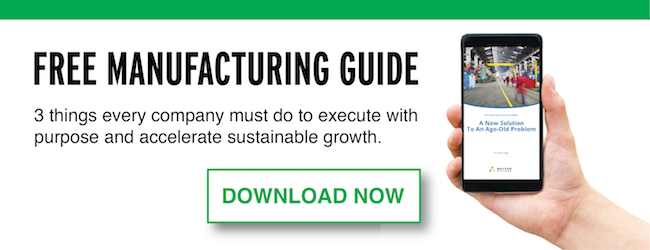Two key concepts in manufacturing that often get misconstrued or even used synonymously are manufacturing productivity and manufacturing efficiency. Do you know what the difference is? Despite these two words about improving the production process of a manufacturing, agriculture, or service sector company, they refer to different things. Once you think about the differences, you can better utilize productivity and efficiency in your business. Read this blog to better understand productivity vs efficiency and how it impacts your manufacturing business.
Manufacturing Productivity
The definition of “productivity” from a manufacturing perspective is “the ratio of output to input in production” and is a measure of efficiency. When something is produced, how much time does it take? What is the quantity—not quality—of the production rate? Think of it like this: Your manufacturing line produces 500 units in one week. If you boost your production rate to 700 units in the following week, your productivity has increased by the amount of goods or 200 units. You have increased the amount of goods produced in the same unit of time. This is an increase in your productivity levels. This applies to both goods and services, even though we'll talk primarily about manufacturing production efficiency in this article, and make sure you are using our manufacturing KPIs.
Furthermore, increasing efficiency can lead to more productivity. Once the manufacturing process gets bolstered by better sales, you begin making investments in elevating the production rate. This may be done through purchasing automated equipment to produce goods, improving logistics, acquiring more skilled laborers, and implementing LEAN manufacturing methodologies. When the line moves faster, your measure of productivity increases.
Manufacturing Efficiency
Where productivity was more focused on increasing the quantity being manufactured, efficiency refers to the quality and effectiveness of the work being done. The definition is “the ability to do something or produce something without wasting materials, time, or energy.” This means that efficiency is often expressed by a percentage, with 100% being the ideal target with maximum efficiency so goods are produced at the lowest average total cost, with all else being constant.
However, many manufacturing companies may only be running at 60-80% efficiency. For example, you produced 40% more units in one month than the prior period but later learned that 30% of those units were defective. Though productivity has gone up, efficiency has gone down. Better selection of raw materials can lead to increased efficiency by being easier to work with and improving consistency. You want to make sure that you maximize efficiency (or at least not lose it) as you increase your output for the period.
Another way to look at efficiency is the number of earned hours of good quality productive work divided by the number of work hours available in a day. You may also refer to this as a measure of your return on
There are various ways to boost efficiency that also boost productivity: investing in improvements in the manufacturing line and those responsible for it. Design for Six Sigma was introduced to ensure processes are designed to be efficient and successful from the initial design stage. You may have heard the statement that you cannot build quality into a poor design and it is very true.
Manufacturing Productivity vs Efficiency
Finding a steady balance between manufacturing productivity and efficiency is crucial to making your manufacturing company function at its best. Emphasizing one over the other is a dangerous game to play. Imagine ignoring the quality output of your items just to simply churn out enough to meet the demand, only to realize that quality is poor. Now you have lost money and the trust of your consumers and you may never be able to get them back. It is not simply about the number of units produced or maximum production, these goods must also maintain high quality and pass customer inspection.
Conversely, becoming strict about efficiency may result in frightening employees. This is where we need to be careful when implementing LEAN methodologies properly so that workers are not concerned about losing their jobs due to increased efficiencies.
So, how do you merge the two? A common practice is to increase output while investing in your employees simultaneously. Whenever changes are made, it is natural for employees to be uneasy. Effective training and understanding of the entire production line, right down to how important they are in making the product or delivering the service, will help. It is just as important for employees to know how the product is going to be used so they can contribute to improving the product or service firsthand. Employee empowerment is key.
To sum it up, productivity is solely about output versus input. Meanwhile, efficiency deals with doing the correct things the right way, minimizing mistakes and losses while maximizing the use of valuable resources. When these two concepts come together harmoniously, the company will see an increase in both quantity and quality. Though different, productivity and efficiency rely on one another greatly.
Good luck maximizing the effectiveness of your organization and feel free to reach out if you'd like to see how we can help you.




